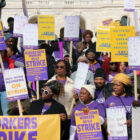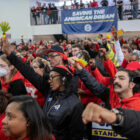Workers
La historia laboral más importante en este momento está en Minnesota. Podría ser el modelo que todos necesitamos.
|
Brenda Johnson de la Federación de Maestros de Minneapolis Local 59 y Eva López de SEIU Local 26 en una reunión en octubre de 2023 donde muchos de los grupos comunitarios y sindicatos alineados alrededor de la fecha límite de hoy del 2 de marzo elaboraron estrategias sobre la mejor manera de aprovechar su poder colectivo. (PHOTO CREDIT: CORTESIA DE GEOFF DITTBERNER, SEIU MINNESOTA)










